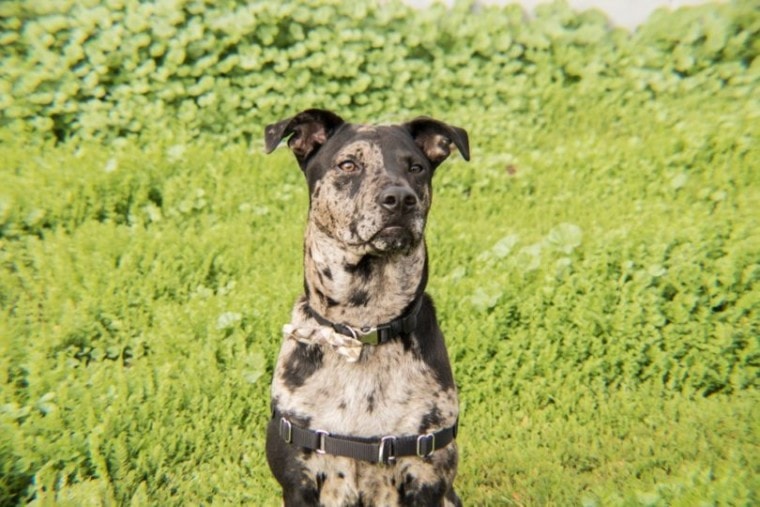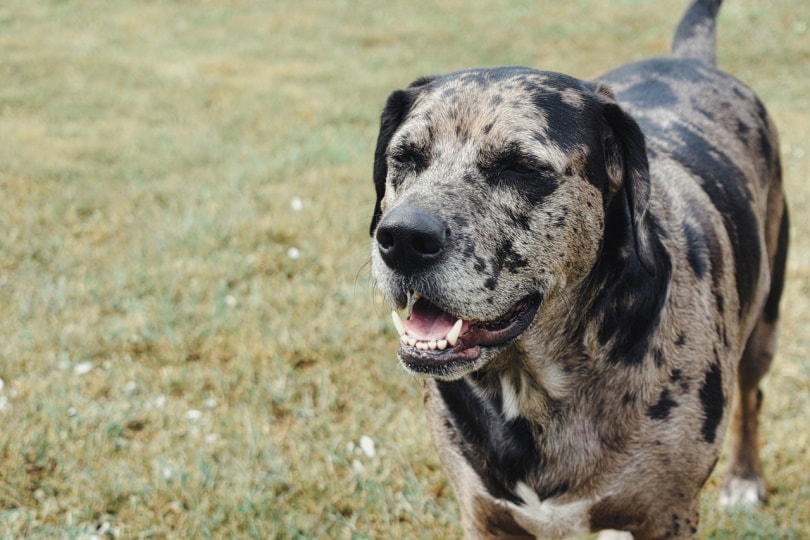
Click Below to Skip Ahead
The Louisiana Catahoula Leopard Dog, or Catahoula Leopard Dog, is an impressive breed with a strong work ethic. They came into existence when early settlers started breeding dogs that could champion the marshes and swamps of Louisiana.
To this day, this breed is a devoted companion and working dog to many people. They’re brave and independent, but they’re also loyal and even doting to their humans.
Breed Overview
Height:
22 – 24 inches
Weight:
50 – 95 pounds
Lifespan:
10 – 14 years
Colors:
Black, blue, brindle, chocolate, red, yellow, blue merle, red merle, white merle, yellow merle
Suitable for:
Active families, house with a yard
Temperament:
Independent, loyal to their families, very active
Catahoula Leopard Dogs can become a loving family member, but not everyone gets to see the affectionate and sweet side of their nature. A lot of hard work and consistency goes into properly training this breed. However, it’s worth the effort because Catahoula Leopard Dogs can be one of the most devoted companions.
This breed loves challenges, so if you also love a good challenge, you two might be a match made in heaven. Keep reading to see if a Louisiana Catahoula Leopard Dog is a good fit for you.
Louisiana Catahoula Leopard Characteristics
Louisiana Catahoula Leopard Dog Puppies
Overall, Louisiana Catahoula Leopard Dogs are very active working dogs that value companionship. Ideal owners for this breed have an active lifestyle and can spend a lot of time with them.
Since Catahoula Leopard Dogs are high-energy working dogs, they don’t make good apartment dwellers. They need space to run around and have plenty of mentally stimulating work to do. If they don’t have these needs met, all this energy can channel into destructive behaviors.
Temperament & Intelligence of the Louisiana Catahoula Leopard Dog
Louisiana Catahoula Leopard Dogs tend to be excellent watchdogs because they’re discerning, intelligent, and protective. However, owners must earn their trust before they can see all these great characteristics.
Catahoula Leopard Dogs are independent and aren’t afraid of asserting themselves. Therefore, they also require firm and consistent training from an experienced owner.
Are These Dogs Good for Families? 👪
Louisiana Catahoula Leopard Dogs can live happily within a family. However, they’re primarily companion dogs, meaning they tend to form strong bonds with one or two people. They don’t do well being by themselves for long hours because they enjoy spending time with their people.
Early socialization and training are necessary for Catahoula Leopard Dogs to live harmoniously with younger children. These dogs will act aggressively towards mistreatment and may be impatient with children who don’t know how to respect their boundaries.
If you bring home a Catahoula Leopard Dog puppy, make sure to supervise any interactions with children. These dogs have a lot of energy, so they may accidentally knock down small children. Also, make sure to teach children how to approach dogs and play with them without provoking any aggressive behaviors.

Does This Breed Get Along with Other Pets?
Again, early socialization is key. Louisiana Catahoula Leopard Dogs can live with other dogs and animals, but it’s often best for them to be the only pet in the family. Early socialization will strengthen the chances of this breed living with other pets, but it’s not guaranteed.
People bred these dogs to hunt, so they have a natural hunting and herding instinct. Therefore, they shouldn’t be left alone with small pets. Males also tend to be more territorial, so they can show aggression towards another dog, especially if it’s another male.
Things to Know When Owning a Louisiana Catahoula Leopard Dog:
Food & Diet Requirements 🦴
The recommended daily amount of food for this breed ranges from 3 to 5 cups of high-quality dog food. The amount of food heavily depends on the dog’s size and lifestyle. Louisiana Catahoula Leopard Dogs vary in size, so not all of them will eat equal amounts. If they also spend most of their days hunting or working, they can eat more.
Since this breed is very active, they will benefit from a high-protein diet with easily digestible carbs, such as corn or rice. Look for dog food that contains animal protein as the main ingredient, such as beef or chicken. Avoid meat meal, which is ambiguous and may not be safe to consume.
Active breeds will also benefit from high-fat foods that contain enough calories to support their weight. Working dogs also require joint support, so look for foods that contain chondroitin and glucosamine. There are also plenty of reputable joint supplements that you can add to your dog’s diet.
Above all else, make sure to consult with your veterinarian to determine the best diet and portion for your dog.
Exercise 🐕
This breed is very active. As working dogs, they require both physical and mental stimulation. You can expect to spend at least an hour of daily physical exercise for this breed.
As a result, they don’t do well living in apartments. They do best in a home with a fenced yard. Since they tend to be territorial and have a strong prey drive, they may run away if they see another dog or animal.
Because they have high energy, they are suited best for people with active lifestyles. They make excellent hunting and hiking companions and can keep up with most types of strenuous activities.
Training 🎾
Louisiana Catahoula Leopard Dogs are best for experienced dog owners who can provide adequate training. They’re an intelligent breed that will respond positively to fair and firm training, and they thrive on consistent training schedules. They will retaliate against mistreatment and physical abuse.
Specific things to focus on for this breed are early socialization and leash training. Enroll your puppy in puppy socialization classes and gradually introduce them to new environments, such as parks and pet stores.
This breed is also susceptible to developing unsafe leash-pulling habits because they’re strong and have a fierce prey drive. Make sure to start leash training as soon as possible so that you can enjoy safe walks together.
Overall, Louisiana Catahoula Leopard Dogs are working dogs, so they naturally thrive on training and pleasing their owners. They will enjoy having a job, such as carting, herding, or retrieving. If you give this breed consistent training, clear expectations, and a job, they will become devoted and loving companions.
Grooming ✂️
The Louisiana Catahoula Leopard Dog has minimal grooming requirements. It has a short, single coat, so you typically don’t have to worry about matting. This breed sheds regularly. Brushing several times a week can reduce the amount of fur that gets stuck in your clothes and furniture.
This breed also doesn’t require too many baths. You can bathe and groom them on an as-needed basis. They do have long nails that grow fast, so regular nail filing or clipping is a must.
As with other dogs, the Catahoula Leopard Dog requires regular teeth brushing and ear check-ups to avoid infection and wax buildup.
Health and Conditions 🏥
Serious Conditions: This breed may develop hip dysplasia, and there’s also a genetic risk of deafness (in mostly white Catahoula Leopard Dogs) and eye problems. Regular veterinary check-ups can boost early detection to treat these issues before they become significant problems. Make sure to work with your vet to monitor these conditions.
Minor Conditions: This breed can develop hypothyroidism and an underbite. Dogs can take pills with replacement hormones to treat hypothyroidism. An underbite usually isn’t a significant health problem, but dogs can have some orthodontic work done if tooth positioning causes them severe pain.
Male vs Female
Louisiana Catahoula Leopard Dogs typically have innate traits of high energy and protectiveness, so both males and females tend to be very active and watchful.
However, male Catahoula Leopard Dogs can be more territorial and aggressive than females, and they tend to be warier of strangers. Female Catahoula Leopard Dogs are often more relaxed and may have an easier time socializing with other pets.
Individual temperament and training play a significant role that can supersede generalizations. A dog that doesn’t receive adequate training will most likely display more destructive behaviors, regardless of sex.
Neutering and spaying dogs can also affect levels of aggression and possessiveness. Therefore, a neutered male Catahoula Leopard Dog can have a more docile temperament than an unspayed female with a new litter of pups.
3 Little-Known Facts About theLouisiana Catahoula Leopard
1. People originally bred Louisiana Catahoula Leopard Dogs to hunt wild hogs.
A nickname for these dogs is the Catahoula Hog Dog. When settlers first arrived in Louisiana, they faced a dense population of wild hogs. To address this, they started breeding wild dogs to hunt these hogs.
These wild dogs are the ancestors of the Louisiana Catahoula Leopard Dog. They eventually grew to master hunting in swamps and even developed webbed feet to swim and hunt in water.
2. This breed can climb trees.
These dogs can hunt more than wild hogs. They can also climb trees to hunt prey. This ability is possible because they have long, sharp, and hard nails to grip tree bark.
3. You can find Catahoula Leopard Dogs in popular books and TV shows.
Many crime fiction and mystery writers feature this breed in their work. A Catahoula Leopard Dog had a significant role in the plot of a Veronica Mars episode, and another one also appeared in the TV show Bones. A recurring character in The Southern Vampire Mysteries novels owns several Catahoula Leopard Dogs.
Conclusion
Hard work pays off, and this is no exception for Louisiana Catahoula Leopard Dogs. Many people may dismiss them as stubborn and strong-willed. However, they can be one of the best companion dogs if they find a compatible owner.
Earning the loyalty of this breed feels like unlocking a best-kept secret. You’ll be sure to find an affectionate dog beneath the tough exterior. If you’re looking for a good challenge and have the time to invest in training, a Louisiana Catahoula Leopard Dog just might be the perfect dog for you.
Featured Image Credit: B Young, Shutterstock






